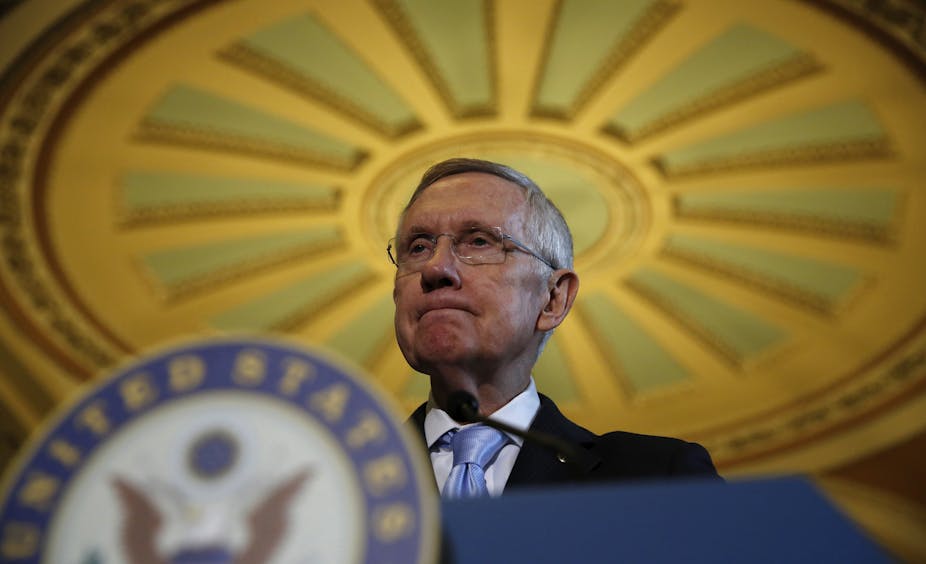Nearly a year ago, Senate Majority Leader Harry Reid pulled the trigger on a parliamentary maneuver many have labeled the “nuclear option.” Democrats were able to change the way Senate Rule XXII, which governs how filibusters can be ended, is interpreted in the Senate. The rule clearly states that a three-fifths vote, normally 60, is required. However, under the precedent established, this is taken to mean a simple majority (since a quorum is 51, anywhere from 26 to 51 votes) can end filibusters on presidential nominations, including judicial nominations below the Supreme Court.
Republicans were outraged. Republican Leader Mitch McConnell complained, “…[Democrats] believe that one set of rules should apply to them–and another set to everybody else…” He added that Democrats are “willing to do and say just about anything to get [their] way.” He called Reid, “the worst leader of the Senate ever” and accused Democrats of a “power grab”.
Only three Democrats in the Senate opposed the use of the nuclear option, Carl Levin (D-MI) who is retiring, Mark Pryor (D-AR) who was defeated for reelection and Joe Manchin (D-WV). Levin, on the Senate floor, quoted the late Senator Edward Kennedy, “Neither the Constitution, nor Senate Rules, nor Senate precedents, nor American history, provide any justification for selectively nullifying the use of the filibuster”.
Nonetheless, 52 Democratic senators joined in overturning a ruling by the President pro tempore Patrick Leahy to create the new precedent by using the nuclear option. The Democratic base demanded and applauded its use.
Democrats have already used their simple majority cloture to end debate on judicial nominations 69 times to place President Obama’s nominees on the federal bench for life.
The tables have turned
Now that Republicans have taken control of the Senate, Republicans who had previously decried the Democrats audacity have begun to oppose repairing the Senate’s rule. Conservative organizations are demanding payback. They want the GOP leadership to keep the new precedents in force so that the next Republican president (if he has a GOP majority) can swing the federal courts back in the other direction.
Orrin Hatch, who will become the next President pro tempore, co-authored a piece in the Wall Street Journal asserting, “The nuclear option allowed President Obama and his allies to reshape the judicial branch dramatically to suit their far-left agenda.
It’s clear what’s happening here. Senator Hatch who previously opposed the nuclear option, doesn’t even try to hide his motivations. He writes, "It will fall to the next Republican president to counteract President Obama’s aggressive efforts to stack the federal courts in favor of his party’s ideological agenda. But achieving such balance would be made all the more difficult–if not impossible–if Republicans choose to reinstate the previous filibuster rule now that the damage to the nation’s judiciary has already been done.” He concludes “Simply put, if Republicans re-establish the judicial-nomination filibuster, it would remain in place only until the moment that a new Democratic majority decided that discarding the [rule again would be useful”.
Are we in for more of the same?
All of this lays bare why using the nuclear option to distort Rule XXII was a huge mistake. Throughout history, presidents have understood that the minority’s privileges under the rules in the Senate meant that they must take into account the views of minority senators. Typically, they selected nominees sufficiently within the mainstream to be acceptable to at least some senators on the other side of the aisle.
Now any president whose party is in the majority in the Senate can freely nominate partisan ideological choices with the confidence that the majority will back them.
Incoming Majority Leader McConnell has not said what he will do. He is an institutionalist who loves the Senate. In the past, he has suggested that Republicans might restore the precedent to reflect the plain language of the rule. Clearly, he is now being pressured by conservative leaders and groups to do the opposite. On the other hand, last November, as the Democrats pulled the trigger on the nuclear option, McConnell warned, “If you want to play games, set yet another precedent that you will no doubt come to regret… you will regret this, and you may regret it a lot sooner than you think.”
For the moment, Democrats left nomination of justices to the Supreme Court out. A supermajority of 60 votes is still necessary to end the debate and permit confirmation. However, the line drawn between other federal courts and the Supreme Court was likely drawn only because Reid did not have the necessary votes without it. It is nearly inevitable that erasure of that line awaits only the first time a president’s Supreme Court nominee is filibustered by a minority. The nuclear option would be quickly dusted off and employed again.
If Democrats and Republicans are able to place judges on the courts without any input from the minority, we will likely see a permanent politicization of our federal courts. Confidence in the system of justice rests on the impartiality of judges. Can this confidence survive a system which encourages partisan polarization of the courts?

